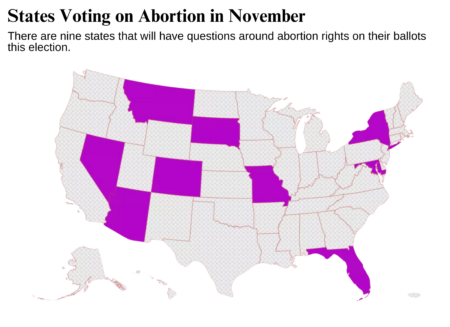Oswald Clark:
West Virginia could outlaw euthanasia
 Voters in ten states will decide the fate of abortion laws after abortion advocates organized to get referenda on the issue on the ballot.
Voters in ten states will decide the fate of abortion laws after abortion advocates organized to get referenda on the issue on the ballot.
The ten states are Arizona, Colorado, Florida, Maryland, Missouri, Montana, Nebraska, Nevada, New York, and South Dakota.
In Maryland and New York, the legislature voted to put the constitutional amendment on the ballot this fall, while in the other states, citizen-initiated referendum, often backed by the financial clout of the abortion industry and left-wing billionaires, put the amendments on the ballot. In almost all the cases, there was litigation to prevent or ensure the amendment made it to the ballot. Pro-abortion organizers in Arkansas came up short in getting the issue on ballots in that state.
In Arizona, a proposed constitutional amendment would create the “fundamental right” to abortion until “fetal viability” at about 24 weeks gestation. After viability, abortion would be restricted to cases of when the life or health of the pregnant woman is at risk. Currently in Arizona abortion is legal until the 15th week although there is an exception to save the woman’s life after that point. The ban, which was enacted earlier this year, replacing an unenforced law from the 1800s banning all abortion, would be overturned if the constitutional amendment passes.
An amendment to the state constitution of Colorado would formally declare that “the right to abortion is hereby recognized” and that “government shall not deny, impede or discriminate against the exercise of that right” if passed. It would also outlaw the government from limiting health insurance coverage for abortion, effectively overturning a 1984 law that barred health insurance from covering abortion. Other than that restriction, there are no limits on abortion in Colorado. To pass, the amendment requires the support of 55 per cent of voters.
In Florida, Amendment 4 would add abortion to the state constitution and bar any restrictions on abortion before fetal viability and provide exceptions after that point for “the patient’s health, as determined by the patient’s healthcare provider” – language that pro-life groups say would not limit abortion after the 24-week cutoff. If passed, the amendment would undo the state’s six-week ban on abortion which includes exceptions for cases of rape, incest, and the life of the mother. That law was enacted in 2023 and replaced a later-term cutoff for abortion. Donald Trump opposes the six-week ban but has said he will oppose Amendment 4 despite early indications he might support the constitutional amendment. At least 60 per cent of voters would have to support Amendment 4 to pass.
In Maryland, an amendment to the state constitution would to guarantee the right to “to make and effectuate decisions to prevent, continue, or end one’s own pregnancy.” Currently, abortion is legal until viability and afterward in cases when the mother’s life or health are at risk or when a fetal anomaly is discovered. Only 50 per cent plus one is needed to pass the constitutional amendment.
In Missouri, the proposed amendment to the state constitution states that the government “shall not deny or infringe upon a person’s fundamental right to reproductive freedom,” which is defined as “birth control,” “abortion care” and “miscarriage care” — up until the point of fetal viability. If passed by a simple majority, it would provide exceptions to the limit at viability in cases when the mother’s life or health is endangered. Local pro-life groups say that requiring a health care worker to attest to that an abortion is necessary to protect the “life or physical or mental health” of the mother would not ban any abortions after 24 weeks. Somewhat confusingly, the amendment would permit the government to restrict abortion rights when doing so “is for the limited purpose and has the limited effect of improving or maintaining the health of a person seeking care, is consistent with widely accepted clinical standards of practice and evidence-based medicine, and does not infringe on that person’s autonomous decision-making.” Currently, Missouri bans all abortion except in cases of medical emergencies when the mother’s life is in danger.
In Montana, voters will decide on a constitutional amendment that would recognize “a right to make and carry out decisions about one’s own pregnancy, including the right to abortion.” It specifically outlaws the government “from denying or burdening the right to abortion before fetal viability,” and “prohibit the government from denying or burdening access to an abortion when a treating healthcare professional determines it is medically indicated to protect the pregnant patient’s life or health.” Again, pro-life organizations say the health of the mother exemptions would not effectively deter physicians from committing abortion. Abortion is legal in Montana until fetal viability and a simple majority is all that is necessary to add abortion to the state constitution.
Nebraska has dueling constitutional amendments on its ballot. The first one, “Protect the Right to Abortion” would amend the state constitution to declare “all persons shall have a fundamental right to abortion until fetal viability, or when needed to protect the life or health of the pregnant patient.” A second proposed amendment, “Protect Women and Children,” would bar abortions in the second and third trimesters, except in the case of a medical emergency or in cases of rape or incest. A simple majority is necessary to pass; if they both do, the one with the most votes will take effect. If “Protect the Right to Abortion” prevails, it would nullify the state’s existing abortion law which currently bans abortion after the 12th week except in cases of rape, incest, and to save the mother’s life.
A constitutional amendment in Nevada would enshrine abortion in the constitution up to the point of fetal viability. Abortion is currently legal until the 24th week of pregnancy but abortion advocates hope to prevent restrictions placed on the deadly procedure in the future. In Nevada, constitutional amendments need to be approved twice by voters before they are enacted, so if a simple majority votes for the amendment in November, it will be placed on the ballot again in the 2026 midterm elections.
In New York, the “Equal Protection of Law Amendment” does not explicitly refer to abortion but would prevent the state from doing anything to affect “pregnancy, pregnancy outcomes, and reproductive healthcare and autonomy.” Local pro-life organizations say the absence of the word abortion will not fool New Yorkers that it is a pro-abortion constitutional amendment. A simple majority is necessary to pass and if it does, advocates of the amendment say it would not affect the state’s law of legal abortion until the 24th week.
South Dakota Constitutional Amendment G, the Right to Abortion Initiative, would make abortion legal without limits in the first trimester, permit second-trimester regulations, and allow abortion in the third trimester to “preserve the life or health” of the mother. Dakotans for Health pushed for the amendment calling South Dakota’s abortion ban “the harshest in the nation.” Like Missouri’s law, it permits abortion only when it is necessary to save the life of the mother. The amendment would be approved if passed by a simple majority.
Abortion rights constitutional amendments have passed in typically conservative Kansas, and Republican-leaning Ohio voted for enshrining abortion as a constitutional right, both in 2022. Those pro-abortion victories in red states that have elected pro-life governors and senators, have emboldened abortion activists to push for constitutional amendments across the country.
Meanwhile, voters in West Virginia have the opportunity to provide constitutional protection against euthanasia for vulnerable people. Amendment 1 would ensure “No person, physician, or health care provider in the State of West Virginia shall participate in the practice of medically assisted suicide, euthanasia, or mercy killing of a person.” The amendment specifically states that “Nothing in this section prohibits the administration or prescription of medication for the purpose of alleviating pain or discomfort while the patient’s condition follows its natural course; nor does anything in this section prohibit the withholding or withdrawing of life-sustaining treatment, as requested by the patient or the patient’s decision-maker, in accordance with State law.” The amendment also specifically states that it would not affect the death penalty. If passed, Amendment 1 would be the first constitutional amendment outlawing euthanasia, sometimes called Medical Assistance in Dying, thereby thwarting possible court challenges to the state’s prohibition on euthanasia. One advocate for Amendment 1 said “voters in West Virginia can ensure this deadly practice never infiltrates its healthcare system” by passing the amendment.




